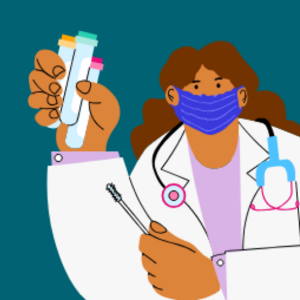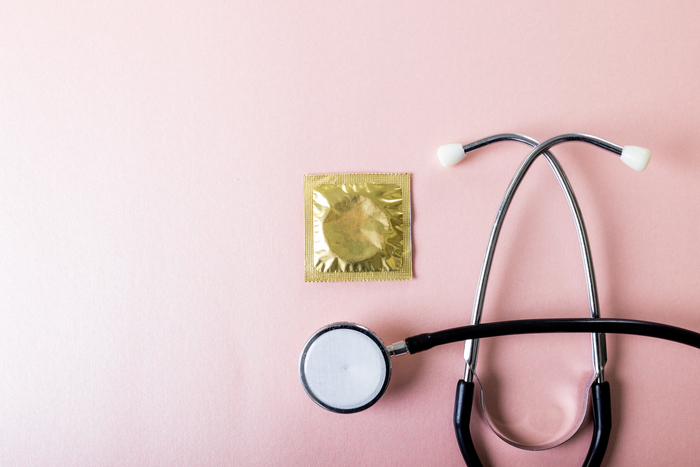
Ensure your health. Get tested today.
Convenient lab testing at your fingertips at more than 5,000 locations nationally. Consult with a doctor, or get tested on your own.

Gonorrhea is one of the most prevalent sexually transmitted diseases (STDs) in the United States, according to the CDC — and they note that it poses a significant public health concern due to its potential to cause serious health complications if left untreated.
This article aims to provide essential information about the gonorrhea test, emphasizing its importance in early detection and treatment. Fortunately, the test is generally painless, making it easier for individuals to take proactive steps in managing their sexual health.
A gonorrhea test is a medical procedure that is used to determine whether an individual has been infected with Neisseria gonorrhoeae, the bacterium responsible for gonorrhea. Getting tested for gonorrhea is the only definitive way to know if you have the infection, according to UpToDate.com. They note that many people with gonorrhea do not exhibit symptoms, making it easy to unknowingly transmit the disease to others.
The test typically involves a simple and painless procedure, such as a urine sample or a swab from the affected area, like the throat, rectum, or genitals, according to the Office on Women's Health. They note that laboratory analysis of these samples can accurately detect the presence of the gonorrhea bacterium, enabling timely treatment and reducing the risk of complications.
It is important to get tested for gonorrhea, especially if you are sexually active with multiple partners or have a new partner, according to the CDC.
Gonorrhea is a sexually transmitted infection that can often go unnoticed because symptoms may not develop until months after the initial infection, according to the Office on Women's Health. They note that this delay in symptom onset can make it challenging to identify and treat the infection promptly, increasing the risk of complications and transmission to sexual partners. Understanding the symptoms of gonorrhea is crucial for early detection and treatment. Here are some common signs and symptoms to watch for:
Discharge from your urethra
Increased vaginal discharge
Scrotal or testicular pain
Lower belly pain
Vaginal bleeding when you’re not on your period
Anal soreness, itching, discharge, or bleeding
Painful bowel movements
Painful urination (dysuria)
Sore throat (if infected through oral sex)
Eye pain or discharge (if infected through the eyes)
Recognizing these symptoms early can help you seek medical advice and treatment in a timely manner, according to UpToDate.com. They explain that this can help reduce the risk of complications and prevent the spread of gonorrhea to others.
Testing for gonorrhea is a straightforward process that can be done through different methods, depending on the area of the body that may be infected, according to the CDC. They explain that early detection is key to effective treatment and preventing the spread of this common sexually transmitted infection.
Primary types of gonorrhea tests used to diagnose the infection accurately include:
A urine test is one of the most common methods for detecting gonorrhea, according to the CDC. They explain that during this test, you will be asked to provide a urine sample, which is then sent to a laboratory for analysis. The test looks for the presence of Neisseria gonorrhoeae bacteria in the urine. This method is particularly useful for detecting infections in the urethra and is generally painless and non-invasive.
A swab test involves collecting samples from potentially infected areas such as the throat, rectum, urethra, or cervix, according to the CDC. They explain that during this test a healthcare provider will use a sterile swab to collect the sample, which is then tested in a laboratory for the presence of the gonorrhea bacteria. This method is highly effective for detecting infections in specific areas and is commonly used when symptoms are localized or when a urine test is not sufficient.
Both tests are essential tools in diagnosing gonorrhea, and your healthcare provider will recommend the most appropriate method based on your symptoms and risk factors, according to the CDC.
Proper preparation is essential for ensuring accurate results when undergoing a gonorrhea test, according to UpToDate.com. They explain that your healthcare provider may give you specific instructions to follow before the test to help achieve the most reliable outcome. The common guidelines that patients are advised to adhere to before their gonorrhea test, according to the CDC, include:
Provide details about the areas of your body involved during sexual activity.
Discontinue the intake of any current antibiotics that might affect the accuracy of your test results.
Avoid urinating within an hour or two before your test.
Do not use douche or vaginal creams for at least 24 hours before testing.
Following these instructions can help ensure that your gonorrhea test results are accurate, allowing for timely and effective treatment if needed, notes the CDC.
Understanding who should get tested for gonorrhea is crucial for maintaining sexual health and preventing the spread of this common sexually transmitted infection, according to UpToDate.com. They note that regular testing is essential for sexually active individuals, especially those with certain risk factors or symptoms. The CDC outlines specific scenarios in which it is recommended to get tested for gonorrhea, which include:
You or your partner suspect symptoms of gonorrhea.
You've engaged in sex without protection with a new partner.
You or your partner had sex without protection with other people.
You have another STD.
A sexual partner informs you they have an STI.
Your healthcare provider informs you of cervical cell inflammation or discharge.
You're expecting a child or planning a pregnancy.
Getting tested in these situations can help ensure early detection and treatment, reducing the risk of complications and preventing the spread of gonorrhea to others, according to the Office on Women's Health.
Gonorrhea tests are generally processed quickly, with results available within one to three days, according to UpToDate.com. However, they also note that the exact timing can vary based on factors such as the type of test performed and the specific laboratory's procedures. While waiting for your results, it is important to avoid engaging in sexual activity to prevent the potential spread of the infection. Abstaining from sex not only protects your partners but also helps you focus on your health and any necessary treatment, according to UpToDate.com.
Additionally, it is encouraged to inform your recent sexual partners that you are undergoing testing for gonorrhea, especially if you are experiencing symptoms, according to the Office on Women's Health. They explain that open communication can help them seek testing and treatment if needed, reducing the risk of further transmission. By taking these precautions, you contribute to better sexual health for yourself and your community.
There are two possible outcomes: detected (positive) or not detected (negative), according to the CDC. Understanding what each result means can help you take appropriate actions, whether it involves seeking treatment or continuing preventive measures.
A positive result indicates that the Neisseria gonorrhoeae bacteria have been detected in your sample, confirming that you have a gonorrhea infection, according to the CDC. They explain that if you receive a positive result, it is essential to follow up with your healthcare provider for appropriate treatment, which typically involves antibiotics. Additionally, you should inform your sexual partners so they can also get tested and treated if necessary, to prevent further spread of the infection.
A negative result means that no Neisseria gonorrhoeae bacteria were found in your sample, indicating that you did not have a gonorrhea infection at the time of the test, according to the CDC. However, they note that it is important to continue practicing safe sex and getting regularly tested if you are sexually active, especially if you have multiple partners or engage in unprotected sex. Regular testing helps ensure early detection and treatment of any future infections.
Understanding these results can empower you to take control of your sexual health, whether it involves seeking treatment or maintaining preventive practices.
Gonorrhea is a treatable sexually transmitted infection that can affect both adults and babies, according to UpToDate.com. They note that early detection and appropriate treatment are crucial to prevent complications and the spread of the infection.
Adults diagnosed with gonorrhea are typically treated with a course of antibiotics, according to UpToDate.com. They explain that it is essential to complete the entire course of prescribed medication to ensure the infection is fully treated. Follow-up testing may be recommended to confirm that the treatment has been successful, notes UpToDate.com.
Babies can contract gonorrhea during childbirth if the mother is infected, according to UpToDate.com. They note that to treat newborns, healthcare providers usually administer antibiotics immediately after birth to prevent complications such as eye infections, which can lead to blindness. Erythromycin eye ointment is commonly used to treat or prevent eye infections in newborns exposed to gonorrhea, according to the Office on Women's Health.
By understanding the available treatments, individuals can take the necessary steps to manage and recover from gonorrhea, ensuring better health outcomes for themselves and their loved ones.
Finding a reliable place to get tested for STDs, including gonorrhea, is essential for maintaining your sexual health. Various healthcare facilities and services offer to test, ensuring that individuals have access to the care they need, according to the Office on Women's Health, including:
Your doctor’s office
A community health clinic
A private clinic
A sexual health clinic
A contraceptive and young people's clinic
At the health department
Home kits are also available from some online retailers
These diverse options provide flexibility and accessibility, ensuring that everyone can find a suitable place to get tested and take control of their sexual health.
A gonorrhea test is a medical procedure used to detect the presence of the bacterium responsible for gonorrhea, usually through a urine sample or a swab from the affected area.
Symptoms may include discharge from the urethra, increased vaginal discharge, scrotal or testicular pain, lower belly pain, vaginal bleeding outside of the menstrual cycle, anal discomfort, painful bowel movements, painful urination, sore throat, or eye pain or discharge.
Regular testing is recommended for sexually active individuals, especially those with multiple partners, a new partner, another STD, or if a sexual partner informs you they have an STI.
Test results are typically available within one to three days, but this can vary depending on the type of test and the specific laboratory's procedures.
A positive result indicates a gonorrhea infection and requires treatment, usually with antibiotics. A negative result means no gonorrhea infection was detected at the time of the test, but regular testing is still recommended for sexually active individuals.
The results of a gonorrhea test will indicate whether or not you have the disease, which can guide the next steps for treatment.
The article does not go into detail about specific treatments, but it does state that there are treatment options available for those who test positive for gonorrhea.
There are various places where you can get tested for STDs, including gonorrhea. It's best to consult with a healthcare provider for options in your area.

Convenient lab testing at your fingertips at more than 5,000 locations nationally. Consult with a doctor, or get tested on your own.